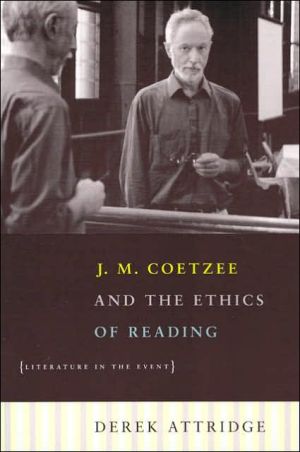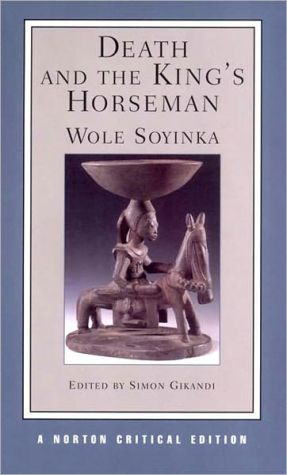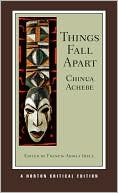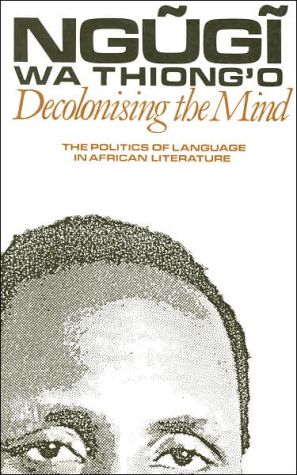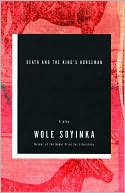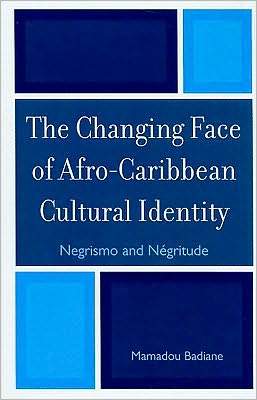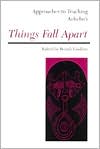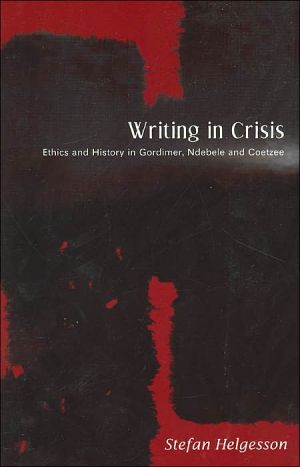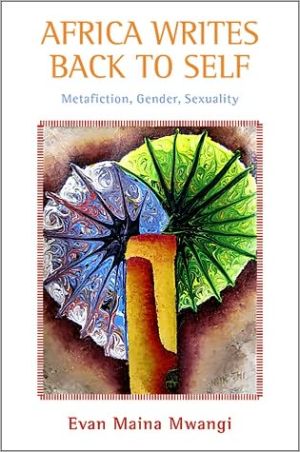J. M. Coetzee and the Ethics of Reading: Literature in the Event
Nobel Prize-winning novelist J. M. Coetzee is one of the most widely taught contemporary writers, but also one of the most elusive. Many critics who have addressed his work have devoted themselves to rendering it more accessible and acceptable, often playing down the features that discomfort and perplex his readers.\ Yet it is just these features, Derek Attridge argues, that give Coetzee's work its haunting power and offer its greatest rewards. Attridge does justice to this power and these...
Search in google:
Nobel Prize-winning novelist J. M. Coetzee is one of the most widely taught contemporary writers, but also one of the most elusive. Many critics who have addressed his work have devoted themselves to rendering it more accessible and acceptable, often playing down the features that discomfort and perplex his readers.Yet it is just these features, Derek Attridge argues, that give Coetzee's work its haunting power and offer its greatest rewards. Attridge does justice to this power and these rewards in a study that serves as an introduction for readers new to Coetzee and a stimulus for thought for those who know his work well. Without overlooking the South African dimension of his fiction, Attridge treats Coetzee as a writer who raises questions of central importance to current debates both within literary studies and more widely in the ethical arena. Implicit throughout the book is Attridge's view that literature, more than philosophy, politics, or even religion, does singular justice to our ethical impulses and acts. Attridge follows Coetzee's lead in exploring a number of issues such as interpretation and literary judgment, responsibility to the other, trust and betrayal, artistic commitment, confession, and the problematic idea of truth to the self.Fabula"An introduction for readers new to Coetzee and a stimulus for thought to those who know his work well."
J. M. Coetzee & the Ethics of Reading \ Literature in the Event \ \ By DEREK ATTRIDGE \ The University of Chicago Press \ Copyright © 2004 The University of Chicago\ All right reserved.\ ISBN: 978-0-226-03117-0 \ \ \ \ \ Chapter One \ Modernist Form and the Ethics of Otherness \ Dusklands and In the Heart of the Country\ : I :\ During the years in which Coetzee's first six novels were written-from Dusklands (1974) to Age of Iron (1990)-there were few places in which the writing and reading of literature was more tested by political exigencies and expectations than South Africa. The demand that the production and judgment of art be governed by its immediate effectiveness in the struggle for change (or occasionally in the resistance to change) was immensely powerful, and in many discussions of South African literature this demand gave rise to a suspicion of anything appearing hermetic, self-referential, formally inventive, or otherwise distant from the canons and procedures of the realist tradition. The cultural climate in the country has altered greatly since the end of formal apartheid and the institution of democratic government in 1994 (an event which coincided with the publication of Coetzee's seventh novel, The Master of Petersburg), and conditions for the reception of work that transgresses the norms of realist fiction are now more favorable.\ However, the questions raised by the strong opposition that work of this kind provoked during the apartheid years remain ones that need to be addressed. Despite the problems inherent in the assumptions that literature can and should serve preexisting political ends and that there is no space for other kinds of work alongside the popular and overtly political, the challenge which such demands direct at "elite art" and its claims is one that cannot be ignored. Lessons learned in South Africa have often proved valuable elsewhere, and the predicament literature found itself in during the struggle against apartheid has implications which extend to writing and reading in less politically fraught contexts.\ Because of its use of nonrealist or antirealist devices, its allusiveness, and its metafictional proclivities, Coetzee's fiction is often adduced as an example of "postmodernism." It would be more accurate, I believe, to characterize it as an instance of "late modernism," or perhaps "neomodernism"; Coetzee's work follows on from Kafka and Beckett, not Pynchon and Barth. However, these labels do not in themselves get us very far in dealing with the relation between form and politics in his writing, given the wide disagreements about their scope and significance. "Modernism" can be a catch-all term for art that is governed by aestheticism, formalism, traditionalism, and political quietism (or reaction), or it can refer to an art of innovation, self-questioning, and the radical displacement of traditional verities. The term "postmodernism" is even less securely defined. There are some who see it as the final de-historicizing of an already anemic modernism, and others for whom it is a historically and politically responsible development of modernism; it is perceived sometimes as a pushing of modernism's claims to a new extreme and sometimes as an undermining of modernism's claims by the application of a version of its own methods.\ The picture becomes even more complicated if we introduce the question of related theoretical discourses. The academic expression of modernism is often held to be New Criticism, with postmodernism having as its theoretical wing post-structuralism; but there are also strong grounds for arguing that post-structuralism is a derivation from and extension of modernism (in the work of such writers as Joyce and Mallarmé), in which case postmodernism either awaits a theoretical model, is its own theorization, or escapes theorization altogether.\ Clearly, different people are talking about different things here. If you conceptualize modernism as a cultural object hammered out on the forges of New Criticism, then postmodernism inevitably comes, hand in hand (or hand in glove) with post-structuralism, to explode that object and the assumptions-transcendentalizing, universalizing, aestheticizing, and so on-that underlie it. If, on the other hand, modernism is viewed through the lens of the post-structuralist theory for which it functioned as the preeminent exemplar, postmodernism is likely to appear less a break with than an intensification of modernism's own detotalizing pressures-unless, that is, it's seen as a betrayal of modernism's radical ideals through capitulation to the marketplace.\ Much of the dispute about the relation between modernism and postmodernism would disappear if there were less compulsion to define, in a totalizing and positivistic spirit, diverse contemporaneous cultural practices. Nevertheless, the question of the relationship between today's most influentially innovative art and the equivalent art of the decades between the wars remains an important and ill-understood one. It becomes particularly important when one is considering, as I am here, an artistic practice operating under intense political pressures. Do the techniques of modernism belong to a moment of capitulation and self-reflexiveness which offers the worst possible model for the politically responsible artist? And if so, is postmodernism, insofar as it continues along the modernist path of formal experiment and exposure of its own conventions, inescapably apolitical? Or is modernist innovation a possible source for a political art that recognizes the dangers of a merely instrumental artistic practice-and postmodernism, in some of its manifestations at least, the working out of such a practice?\ Whether Coetzee's work should be labeled "modernist" or "postmodernist" is a significant question only insofar as it raises further questions about the practice of formal innovation and disruption that begins in the modernist period (though of course it has antecedents and foreshadowings in earlier periods). My argument, briefly, is that what often gets called (and condemned as) the self-reflexiveness of modernist writing, its foregrounding of its own linguistic, figurative, and generic operations, its willed interference with the transparency of discourse, is, in its effects if not always in its intentions, allied to a new apprehension of the claims of otherness, of that which cannot be expressed in the discourse available to us-not because of an essential ineffability but because of the constraints imposed by that discourse, often in its very productivity and proliferation. Since the modernist period proper, there have continued to appear works with this kind of responsiveness to the demands of otherness, achieved by means which, whatever their specific differences, are clearly related to one another in their general strategies.\ This modernism after modernism necessarily involves a reworking of modernism's methods, since nothing could be less modernist than a repetition of previous modes, however disruptive they were in their time. An instance of such a tendency to repeat would be the work of another contemporary South African novelist, André Brink, whose series of novels (fifteen at the time of writing) constitute an impressive record of engagement with the political conflicts of his native country, yet whose use of modernist (or postmodern) techniques contributes much less to the success of his fiction than the essentially realist storytelling they sometimes mediate. Thus Brink's 1982 novel A Chain of Voices utilizes the Faulknerian device of short personal narratives out of which a larger story gradually shapes itself, without the emergence of a totalizing and adjudicating central voice. It's a powerful novel, but its power derives not from an apprehension of otherness, as one might expect from its subject matter (a slave rebellion on a number of Boer farms in the Cape in 1825), but from the illusion of empathy and understanding that the intimate individual disclosures produce. States of Emergency (1988) is another novel by Brink that exploits the self-reflexivity characteristic of some modernist practice, staging very directly the conflict between political engagement and the exigencies of literary creation as the central character, a novelist, attempts, at a time of political crisis in South Africa, to write a love story, and life and fiction turn out to be mutually transformative. The overall effect, however, has a slight air of modernism-by-numbers, whatever the intensity of individual sections as representations of the impact of political urgencies on personal lives.\ J. M. Coetzee, I want to argue, does not merely employ but extends and revitalizes modernist practices, and in so doing develops a mode of writing that allows the attentive reader to live through the pressures and possibilities, and also the limits, of political engagement. To make this claim is not to deny what has often been powerfully demonstrated: that a large part of modernist writing was insensitive to the otherness produced by patriarchal and imperialist policies and assumptions. My argument is merely that within what is called modernism, technical resources-and a certain attitude to the operations of language and discourse-were evolved that would make possible a new openness and alertness to such modalities of otherness. It is true that, with some notable exceptions, only in later developments of modernism have these resources been exploited in conjunction with a thematic interest in gender, race, and colonialism. Nor am I claiming that modernism alone uses the formal possibilities of literary writing in this way; the larger reaches of this argument, which I do not intend to enter here, extend to the question of the specificity of literature as a cultural institution and practice during a much longer epoch of Western culture.\ It seems likely that the formal singularity of Coetzee's works is an important part of their effectiveness as literature; what I wish to argue here is that this effectiveness is not separate from the importance these works have in the ethico-political realm, but rather that to a large extent it constitutes that importance. Furthermore, I believe that this importance is considerable. Coetzee's handling of formal properties is bound up with the capacity of his work to engage with-to stage, confront, apprehend, explore-otherness, and in this engagement it broaches the most fundamental and widely significant issues involved in any consideration of ethics and politics. I also believe that what happens in Coetzee's work, and in responses to it, is only a more intense version of the processes involved in all successful literary uses of the formal properties and potentialities of language, processes I discuss in The Singularity of Literature.\ One consistent aspect of Coetzee's technique as a novelist is to deny the reader any ethical guidance from an authoritative voice or valorizing metalanguage. We are left to make the difficult judgments ourselves, on the Magistrate's mixed-up humanism, on Michael K's strategy of withdrawal, on Susan Barton's attempts at self-promotion, on Mrs. Curren's clinging to-and letting go of-the truisms of Western democratic liberalism, on David Lurie's sexual predatoriness and adoption of a changed way of living. (It is one of the weaknesses of the novellas of Dusklands in comparison with the later works that we experience little difficulty in passing judgment on their central figures, Eugene Dawn and Jacobus Coetzee.) At the same time, we remain conscious of these narrating figures as fictional characters, as selves mediated by a language which has not forgotten its mediating role, a language with a density and irreducibility which signals its rhetorical shaping, its intertextual affiliations, its saturatedness with cultural meanings. For both these reasons, we can never remove the aura of something like irony that plays about these representations of human individuals-though by the same token we can never determine its strength.\ It is this uncertain irony that makes the protagonist of Life & Times of Michael K-a figure of otherness to most in the society through which he moves-a figure of otherness to the reader as well, even though we are privy to his mental processes and his emotional life. To treat Michael K as a representative of the author, as is sometimes done, is to bring him prematurely within the circle of the same, overlooking the stylistic movements that keep him constantly opaque. And this permanent possibility of irony, this resistance to closure, is, once again, achieved by modernist techniques; it is itself a kind of trust, a kind of wager-an act of writing that signals its own limits and its own dangers, while opening itself to a future of unpredictable readings. Instead of an aesthetics of the static and the essential, preserving its form across time and cultural difference, Coetzee's fiction opens the possibility of an ethics of unique acts, rooted always in the here and now, yet acknowledging a deep responsibility to the otherness of elsewhere, of the past, and of the future.\ The issue of otherness and its political ramifications is, of course, particularly acute in colonial and post-colonial writing, and has been the subject of much discussion. However, the link between this question and the formal practices of literature-and in particular the practices we label "modernist"-has not been given sufficient consideration. The reason for this is obvious: the category of form is closely associated with a tradition of literary (and more generally, artistic) commentary we can call "aestheticism" (recognizing, as we do so, that the term covers a wide variety of works and theories). And aestheticism-with modernism often adduced as a major example-is regarded as being defined precisely by the avoidance of political responsibility, by the vaunting of an artistic autonomy that has little interest in modes of otherness in cultural and political life. Yet the importance of form to literature needs no demonstrating; it is at the heart of every writer's practice, and any account of literature's difference from other textual activities and products-however guarded or problematized-must involve some version of it.\ In order to bring the issue back to the center of discussion, what we need is a way of talking about form (or of that aspect of the literary that has prompted the longstanding use of the term) which avoids the simple opposition with content or meaning that characterizes traditional aesthetic discourse. As long as this conceptual opposition dominates our thinking about art, form will be considered either as a property to be admired and enjoyed in itself, or as merely a means to a political, ethical, historical, or other more "substantial" end. In The Singularity of Literature, I have argued that the literary use of language involves the performing of meanings and feelings, and that what has traditionally been called form is central to this performance. The literary work is an event (though an event that cannot be distinguished from an act) for both its creator and its reader, and it is the reader-not as free-floating subject but as the nexus of a number of specific histories and contextual formations-who brings the work into being, differently each time, in a singular performance of the work not so much as written but as a writing. The meaning of a literary work, then, can be understood as a verb rather than as a noun: not something carried away when we have finished reading it, but something that happens as we read or recall it. And that happening occurs only because the language is shaped and organized, an active shaping and organizing that we re-live as we experience the literariness of the work.\ In order for a literary work to take place, the act of reading must be responsive to its singularity. This is hardly a new or controversial assertion, but what is less easy to grasp is that singularity in this sense exists not in opposition to generality. The literary work is constituted, that is, not by an unchanging core but by the singular fashioning of the codes and conventions of the institution of literature, as they exist and exert pressure in a particular time and place. Its singularity is a uniqueness derived from a capacity to be endlessly transformed while remaining identifiable-within the institutional norms-as what it is. A response that might be called "responsible," that simultaneously reenacts and brings into being the work as literature and not as something else, and as this work of literature and not another one, is a response that takes into account as fully as possible, by re-staging them, the work's own performances-of, for example, referentiality, metaphoricity, intentionality, and ethicity.\ (Continues...)\ \ \ \ \ Excerpted from J. M. Coetzee & the Ethics of Reading by DEREK ATTRIDGE Copyright © 2004 by The University of Chicago. Excerpted by permission.\ All rights reserved. No part of this excerpt may be reproduced or reprinted without permission in writing from the publisher.\ Excerpts are provided by Dial-A-Book Inc. solely for the personal use of visitors to this web site. \ \
1Modernist form and the ethics of otherness : Dusklands and In the heart of the country12Against allegory : Waiting for the barbarians and Life & times of Michael K.323The silence of the canon : Foe654Trusting the other : Age of iron915Expecting the unexpected : The master of Petersburg1136Confessing in the third person : Boyhood and Youth1387Age of bronze, state of grace : Disgrace162Epilogue : a writer's life : Elizabeth Costello192
\ Fabula"An introduction for readers new to Coetzee and a stimulus for thought to those who know his work well."\ \ \ \ \ \ CHOICEA CHOICE Outstanding Academic Title, 2006\ — Outstanding Academic Titles, 2006\ \ \ \ Year's Work in Critical and Cultural TheoryAn important milestone in the critical reception of Coetzee's ongoing oeuvre.\ — Peggy Kamuf\ \ \ \ \ \ H-Net Book ReviewAn accessible, readable analysis of Coetzee's oeuvre. . . . [Attridge's] overall theoretical argument, that modernism holds some insights worth revisiting in the contemporary global context, is powerful. He provides a strong example of how we might move toward a deeper consideration of the ethical force that literature can have for both the reader and the critic.\ — Antonia Smith\ \ \ \ \ \ English Studies in CanadaAttridge's study is not simply a comprehensive and up-to-date discussion of Coetzee's writing but also a compelling meditaiton on what literature is and what it does to its readers. [It] not only convinces us of the significance of Coetzee's novels but also of the significance of Attridge as a literary critic.\ — Mark Libin\ \ \ \ \ \ CHOICEA CHOICE Outstanding Academic Title, 2006\ \ \ \ \ \ Year's Work in Critical and Cultural Theory"An important milestone in the critical reception of Coetzee's ongoing oeuvre."\ \ \ \ \ \ H-Net Book Review"An accessible, readable analysis of Coetzee's oeuvre. . . . [Attridge's] overall theoretical argument, that modernism holds some insights worth revisiting in the contemporary global context, is powerful. He provides a strong example of how we might move toward a deeper consideration of the ethical force that literature can have for both the reader and the critic."\ \ \ \ \ \ English Studies in Canada"Attridge's study is not simply a comprehensive and up-to-date discussion of Coetzee's writing but also a compelling meditaiton on what literature is and what it does to its readers. [It] not only convinces us of the significance of Coetzee's novels but also of the significance of Attridge as a literary critic."\ \ \
